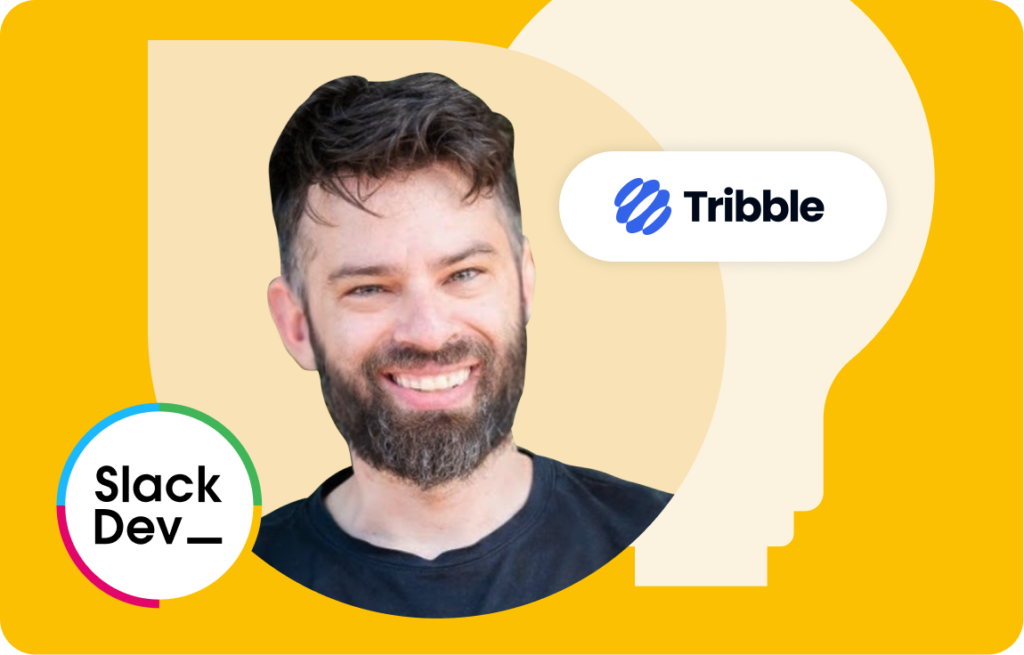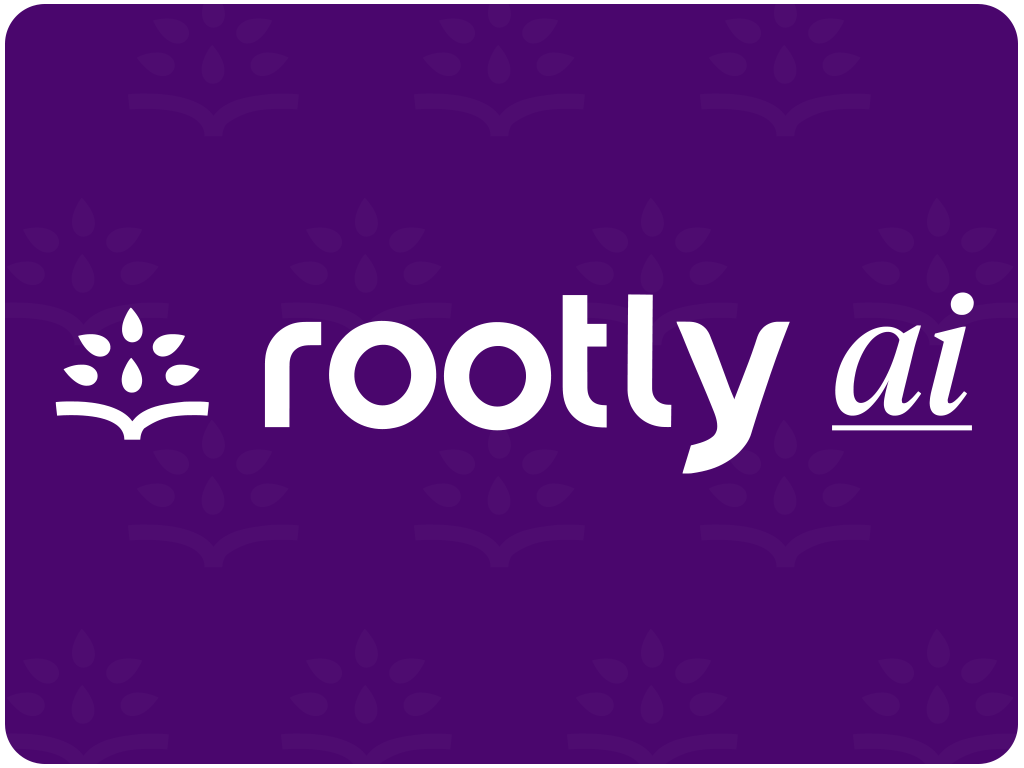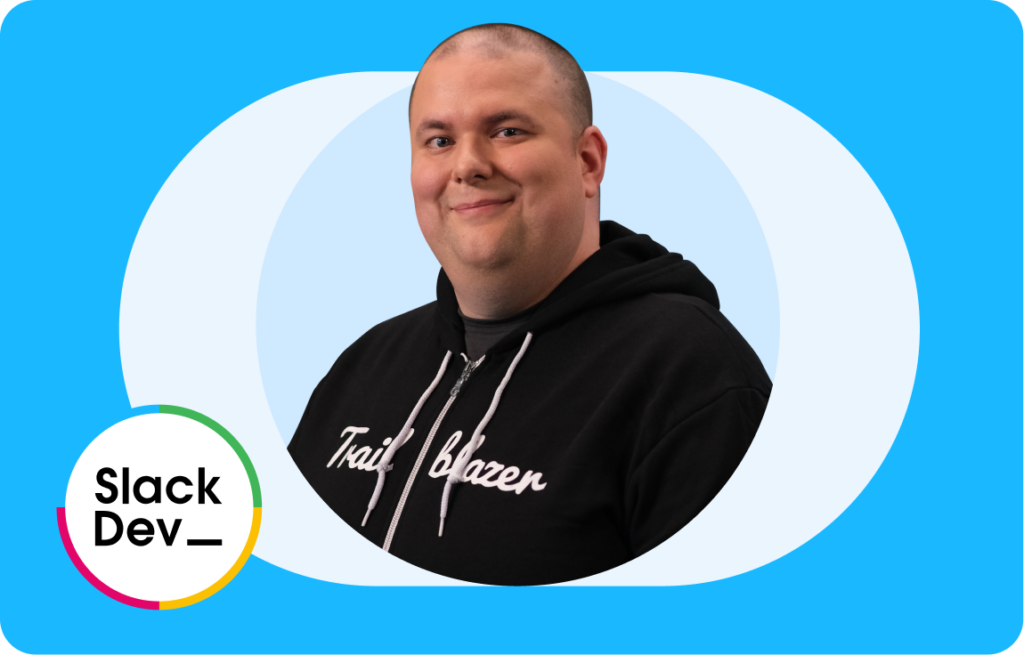Transition into technology
From the stage to the screen, the story of Daniel Sadavoy‘s tech journey is nothing short of a blockbuster. Initially immersed in theater — studying acting and playwriting — Daniel also dabbled in computational neuroscience. When the curtains closed on his theater career, his coding skills snagged him a backstage pass into IT. Fast-forward 14 years, and he’s a founding engineer at Tribble, a company revolutionizing go-to-market teams with autonomous agents.
The first thing I built in Slack…
Daniel’s first foray into building in Slack was motivated by a terrible timesheet process. He whipped up a slick timesheets app that provided an interface to log hours right within Slack, turning a multi-click, multi-screen process into a much better experience. Not only did this make people’s lives easier, but it also proved what was possible with the Slack platform.
Leading the way with agents
Tribble was founded in 2023 by Sunil Rao and Ray Shipley. As ex-sales engineers, their mission was to help scale product, industry, and customer expertise across go-to-market teams. Inspired by the potential of AI, they focused on improving access to solution engineers by building digital agents that help scale an organization’s solution engineering team, an invaluable but often limited resource for most companies.
They identified the best approach: building a conversational AI agent that leverages large language models (LLMs) to handle requests, make informed decisions, and accelerate both the request for proposal and sales processes while also serving as a digital solutions engineer. Daniel, a key member of the Tribble engineering team, helped bring this vision to life. The team chose Slack as its work operating system because it’s where people work every day. Slack’s capabilities for managing high-volume conversations, state tracking, and real-time messaging made it the ideal environment for Tribble’s AI agents to operate effectively.
What sets Tribble apart from its competitors, is its foundation in generative AI, allowing Tribble to create an optimized digital agent experience from the ground up, rather than layering AI on top of an existing solution architected without AI. This strategic approach ensures that Tribble seamlessly integrates with company systems, learns from data, and takes action within the tools teams already in use at their companies — truly redefining how work gets done.
Agentic behavior
An agent is capable of taking a number of different actions and is empowered to decide when and how to take those actions, which Daniel refers to as agentic behavior. This approach sets Tribble agents apart from traditional bots, which use LLMs to answer specific questions, or assistants, which act based on direct prompts. Daniel’s focus at Tribble has been to integrate agentic behavior into the platform, controlling and constraining the agent based on feedback and constant testing.
How it works
For Tribble’s autonomous agents to be effective, they must reliably use the correct information and take accurate actions, all while safeguarding data. The Tribble team achieves this by leveraging its own novel queuing infrastructure and recursive reflection technique that ensures that their agent can self-correct and adapt to dynamic environments, all while maintaining performance and accuracy at scale.
Security is imperative
When it comes to security, protecting customer data is paramount. Tribble has developed a highly secure infrastructure that ensures data is tightly controlled and safeguarded at every level. Customer data is contained securely within the customer’s tenant, maintaining the highest standards of protection throughout the entire process. Unlike other solutions, customer data is never sent directly to LLM providers; it is always kept within Tribble’s controlled cloud infrastructure, ensuring an extra layer of security and compliance.
Developing with natural language and code
Building an agent requires both natural language and traditional code. You have to be able to describe problems at a cognitive level, breaking them down into simple, atomic steps that an LLM can understand. Then, once you ask a question with the right context, not only can the model answer the question, but it can reason about why that’s the right answer. The ability for these models to reason, Daniel says, is the emergent innovation that has unlocked the ability to build agents.
Building a model-agnostic solution
A model-agnostic solution means not being locked to a single AI provider. As models evolve the solution can adapt, with different providers that excel in different domains like language, vision, or coding. To create a model-agnostic solution, Tribble’s engineering team developed a flexible framework that allows the agent to switch models seamlessly without interrupting its workflow. The agent operates by gathering information, executing tasks such as conducting research or interacting with external systems, and reporting the results back to the user. This process was developed by chaining steps together, allowing the agent to loop back and make decisions if it encounters an issue. For instance, if you ask the agent to find a contract, research company processes, and update a knowledge base, it can handle intricacies by asking clarifying questions and recommending options before proceeding. This adaptable workflow enables effective problem-solving in real time.
Working with LLMs
When selecting which base LLM to use, Daniel had to consider which models worked best for particular tasks. Some are better with tool usage and execution, and some have much larger context windows, so the team did a lot of testing with real customers to figure out which one was best for each task or subset of tasks. That helped them figure out which model to use for each task. But, models are constantly changing, so they had to architect a way to be model-agnostic, allowing them to swap out models quickly (within an hour) to make sure they are using the best model for the task and not be tied to one provider.
Testing and verifying
Tips for building agents
Since its inception, Tribble has worked closely with customers to refine and validate its product. These customers use the agent daily, providing feedback that helps Tribble continuously enhance the performance and reliability of the agent. For example, Dave Bloch, a solutions excellence leader at Ironclad, shares that productivity has increased twofold since the introduction of Tribble agents in Slack within their organization.



